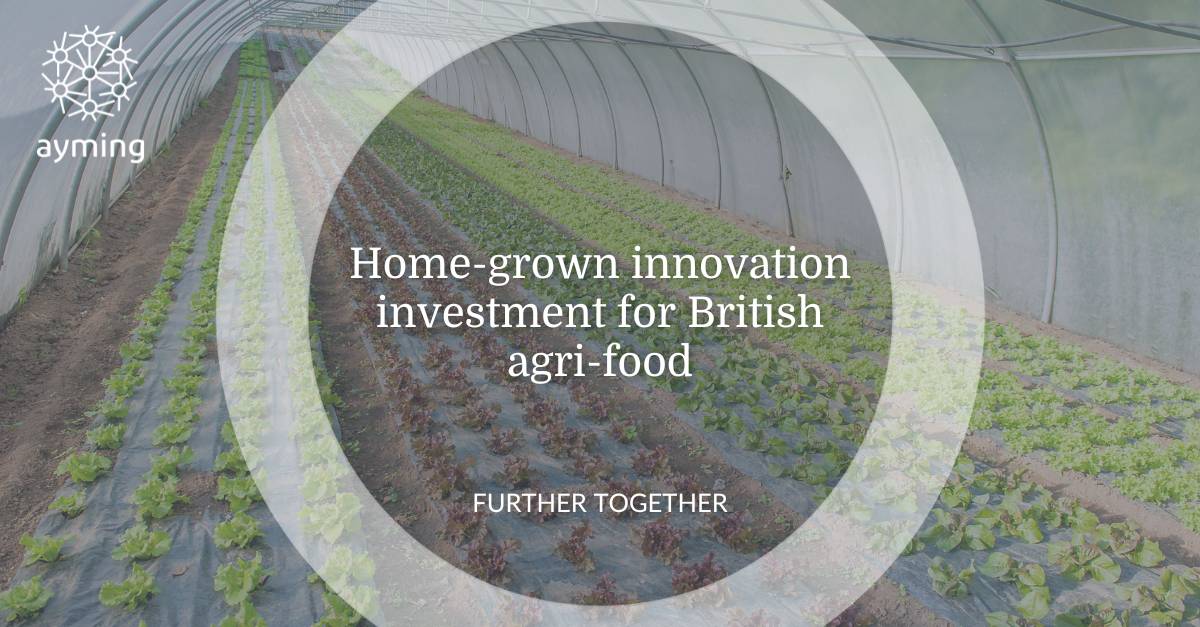British farmers and food producers started the new year with some good news from government. Labelling rules are to be clarified to help make UK products stand out more to consumers, the Department for Environment, Food & Rural Affairs (DEFRA) announced.
This ‘Buy British’ measure may be modest, but it aligns with wider forces at work in the ever-changing UK agri-food industry that are driving innovation and investment in domestic production and strategies at company and national level.
These forces are fundamental and far-reaching. The pandemic, Ukraine war and Brexit disrupted supply chains in different ways. Inflation in the costs of energy, commodities, and shipping imposed further shocks on producers. Global food systems are also being disrupted by the climate crisis, and need to change to become part of the solution. Around a quarter of the UK’s greenhouse gas emissions arise from the agri-food industry.
Increasing UK agri-food production
In response to these price signals, supply risks and sustainability pressures, many manufacturing companies have sought to ‘reshore’ production and source more in the UK. Food production is the UK’s largest manufacturing sector. There are numerous examples across the agri-food sector of increased production and sourcing from within these shores.
Demand from the big bakers has made it worthwhile for arable farmers to grow wheat rather than cattle feed for the domestic market. Wine production is expanding. Major investments – from Mowli’s Scottish salmon farms to Thanet Earth’s hothouses producing tomatoes, cucumbers and peppers in Kent – are reaping bumper harvests.
In 2023, the UK’s top 150 food suppliers increased their capital investment by 25% to £2.6 billion, according to an annual survey for The Grocer. The rise reflected major contributions by multinationals and some catching up after the Covid hiatus. However, the scale of the challenge involved in replacing old assets to boost productivity and energy efficiency while meeting environmental standards cannot be under-estimated.
Overcoming squeezed margins
Investing companies must bear the increased cost of capital at a time when their margins are also being squeezed amid the cost-of-living crisis. Last year saw an all-time low for the top 150’s operating margins, as they fell from 6.2% to just 3.9%. Across the economy, Brexit has had a chilling effect on UK business investment, and economic growth is set to remain flat in the short term.
Against this unpromising backdrop, Tata Consumables, which has invested heavily in its Stockton-on-Tees production facility, backed the industry’s call for government support to encourage manufacturing investment in the UK.
Some of the funding packages available were set out in the national food strategy, launched in June 2022. Among its aims are a prosperous and sustainable agri-food and seafood sector bolstering food security. It also seeks “to broadly maintain” the overall level of domestic production of the last 20 years – around 75% of total food consumption – while targeting particular growth areas.
Food manufacturing, alternative proteins, horticulture and seafood have been earmarked for significant expansion. Energy policy will incentivise industrial horticulture, including high-tech, controlled growing environments such as multi-acre glasshouses and vertical farms. A £100 million UK Seafood Fund supports science and innovation in aquaculture. More than £270 million was committed to the Farming Innovation Programme, along with £120 million for food system research in partnership with UK Research and Innovation (UKRI). Phase 3 of the Industrial Energy Transformation Fund (IETF), launched in January 2024 supports the development and deployment of technologies that enable businesses with high energy use to transition to a low carbon future. This third phase is open to Controlled Environment Horticulture for the first time, supporting the agri-food sector.
Supporting innovation and meeting net-zero
The funds focused on the UK agri-food sector are just a slice of the government’s budget for grants to support innovation and the transition to net zero. This has increased significantly, with Innovate UK’s spend rising 65% in the three-year period to 2024-25, and £4.5 billion in grants set aside to accelerate decarbonisation in various ways – from transport and industrial processes to heat, buildings and natural resources.
These funding pots offer significant opportunities for businesses to reduce the costs of innovation and measures to become energy-efficient or decarbonise. And they sit alongside the ‘bread and butter’ support for research and development – R&D tax credits.
While SMEs often overlook their potential eligibility for some of this help from the public purse, large companies more commonly lack a coherent strategy to maximise access to grants and relief when pursuing multiple projects across different areas of their business.
In the ultra-competitive and challenging agri-food marketplace, clearer labelling may encourage consumers to put more home-produced products in their shopping baskets. Producers aiming to meet that demand also need clarity on the aid available to reduce costs and de-risk their investments.
“We are business performance experts who combine highly specialised knowledge – across a range of fields – with hands-on collaboration, to enable our clients and their people to go further. We are a global team of 1,300 colleagues working across 15 countries in Europe, North America and Asia, and have a 30-year track record of providing leadership and sharing insight.
By focusing on innovation, finance, operations and people we are proven to deliver a return on investment.”
Please visit the firm link to site





